Related Research Articles
American English,sometimes called United States English or U.S. English,is the set of varieties of the English language native to the United States. English is the most widely spoken language in the United States and in most circumstances is the de facto common language used in government,education and commerce. It is also the official language of most US states. Since the late 20th century,American English has become the most influential form of English worldwide.

French is a Romance language of the Indo-European family. It descended from the Vulgar Latin of the Roman Empire,as did all Romance languages. French evolved from Gallo-Romance,the Latin spoken in Gaul,and more specifically in Northern Gaul. Its closest relatives are the other langues d'oïl—languages historically spoken in northern France and in southern Belgium,which French (Francien) largely supplanted. French was also influenced by native Celtic languages of Northern Roman Gaul like Gallia Belgica and by the (Germanic) Frankish language of the post-Roman Frankish invaders. Today,owing to the French colonial empire,there are numerous French-based creole languages,most notably Haitian Creole. A French-speaking person or nation may be referred to as Francophone in both English and French.

Persian,also known by its endonym Farsi,is a Western Iranian language belonging to the Iranian branch of the Indo-Iranian subdivision of the Indo-European languages. Persian is a pluricentric language predominantly spoken and used officially within Iran,Afghanistan,and Tajikistan in three mutually intelligible standard varieties,namely Iranian Persian,Dari Persian,and Tajiki Persian. It is also spoken natively in the Tajik variety by a significant population within Uzbekistan,as well as within other regions with a Persianate history in the cultural sphere of Greater Iran. It is written officially within Iran and Afghanistan in the Persian alphabet,a derivative of the Arabic script,and within Tajikistan in the Tajik alphabet,a derivative of the Cyrillic script.
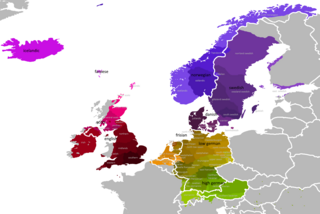
The Germanic languages are a branch of the Indo-European language family spoken natively by a population of about 515 million people mainly in Europe,North America,Oceania and Southern Africa. The most widely spoken Germanic language,English,is also the world's most widely spoken language with an estimated 2 billion speakers. All Germanic languages are derived from Proto-Germanic,spoken in Iron Age Scandinavia and Germany.

Modern Standard Hindi,commonly referred to as Hindi,is an Indo-Aryan language spoken chiefly in North India,and serves as the lingua franca of the Hindi Belt region encompassing parts of northern,central,eastern,and western India. Hindi has been described as a standardised and Sanskritised register of the Hindustani language,which itself is based primarily on the Khariboli dialect of Delhi and neighbouring areas of North India. Hindi,written in the Devanagari script,is one of the two official languages of the Government of India,along with English. It is an official language in nine states and three union territories and an additional official language in three other states. Hindi is also one of the 22 scheduled languages of the Republic of India.

Italian is a Romance language of the Indo-European language family that evolved from the Vulgar Latin of the Roman Empire. Italian is the least divergent Romance language from Latin,together with Sardinian. Spoken by about 68 million people (2022),Italian is an official language in Italy,San Marino,and Switzerland,and is the primary language of Vatican City. It has official minority status in Croatia and in some areas of Slovenian Istria.
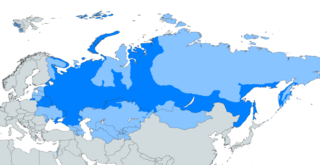
Russian is an East Slavic language,spoken primarily in Russia. It is the native language of the Russians and belongs to the Indo-European language family. It is one of four living East Slavic languages,and is also a part of the larger Balto-Slavic languages. It was the de facto and de jure official language of the former Soviet Union. Russian has remained an official language in independent Russia,Belarus,Kazakhstan,and Kyrgyzstan,and is still commonly used as a lingua franca in Ukraine,Moldova,the Caucasus,Central Asia,and to a lesser extent in the Baltic states and Israel. It is also one of the six official languages of United Nations.
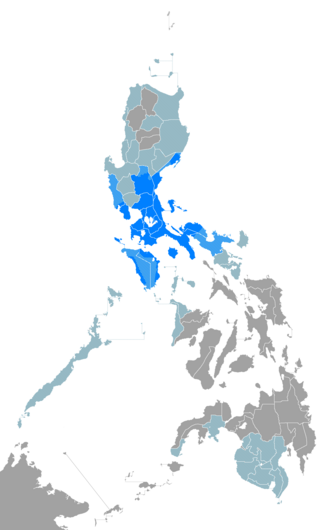
Tagalog is an Austronesian language spoken as a first language by the ethnic Tagalog people,who make up a quarter of the population of the Philippines,and as a second language by the majority. Its standardized form,officially named Filipino,is the national language of the Philippines,and is one of two official languages,alongside English.

Urdu is an Indo-Aryan language spoken chiefly in South Asia. It is the national language and lingua franca of Pakistan,where it is also an official language alongside English. In India,Urdu is an Eighth Schedule language whose status and cultural heritage is recognised by the Constitution of India;and it also has an official status in several Indian states. In Nepal,Urdu is a registered regional dialect and in South Africa it is a protected language in the constitution. It is also spoken as a minority language in Afghanistan and Bangladesh,with no official status.

The monarchy of the United Kingdom,commonly referred to as the British monarchy,is the constitutional form of government by which a hereditary sovereign reigns as the head of state of the United Kingdom,the Crown Dependencies and the British Overseas Territories. The current monarch is King Charles III,who ascended the throne on 8 September 2022,upon the death of his mother,Queen Elizabeth II.
Indian English (IE) is a group of English dialects spoken in the Republic of India and among the Indian diaspora. English is used by the Indian government for communication,along with Modern Standard Hindi,as enshrined in the Constitution of India. English is also an official language in seven states and seven union territories of India,and the additional official language in seven other states and one union territory. Furthermore,English is the sole official language of the Indian Judiciary,unless the state governor or legislature mandates the use of a regional language,or if the President of India has given approval for the use of regional languages in courts.

Languages spoken in the Republic of India belong to several language families,the major ones being the Indo-Aryan languages spoken by 78.05% of Indians and the Dravidian languages spoken by 19.64% of Indians;both families together are sometimes known as Indic languages. Languages spoken by the remaining 2.31% of the population belong to the Austroasiatic,Sino–Tibetan,Tai–Kadai,and a few other minor language families and isolates. According to the People's Linguistic Survey of India,India has the second highest number of languages (780),after Papua New Guinea (840). Ethnologue lists a lower number of 456.
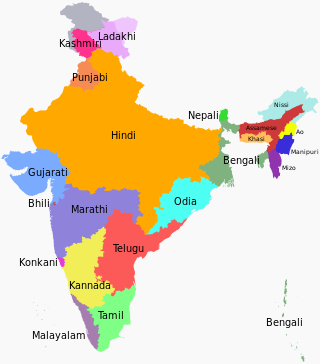
There is no national language in the Republic of India. However,article 343(1) of the Indian constitution specifically mentions that "The official language of the Union shall be Hindi in Devanagari script. The form of numerals to be used for the official purposes of the Union shall be the international form of Indian numerals," while article 343(2) allowed for the continuation of English as an official language for another 15 years and 343(3) gave the parliament the power to provide for the use of English language after this period. The clause 3 of the Official Languages Act,1963 allows for the continued use of English language for official purposes of the Union government and for parliamentary business. Hence Indian English and Modern Standard Hindi are the Official Languages of the Government of India.
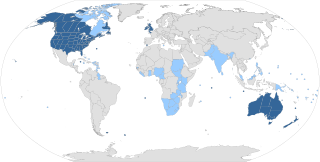
The English-speaking world comprises the 88 countries and territories where English is either an official,administrative,or cultural language. As of the 2000s,between one billion to two billion people globally speak English,making it the largest language by number of speakers,and the third largest language by number of native speakers,as well as the most geographically widespread language. The regions where English is natively spoken by the majority of the population,due to cultural connections to England,are termed "the Anglosphere". Speakers of English are called Anglophones.
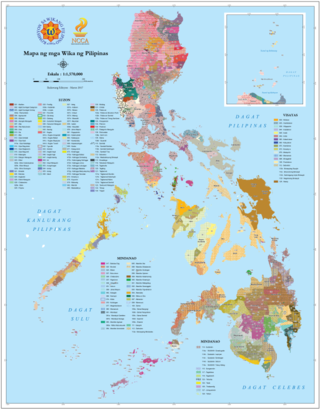
There are some 130 to 195 languages spoken in the Philippines,depending on the method of classification. Almost all are Malayo-Polynesian languages native to the archipelago. A number of Spanish-influenced creole varieties generally called Chavacano along with some local varieties of Chinese are also spoken in certain communities. The 1987 constitution designates Filipino,a standardized version of Tagalog,as the national language and an official language along with English. Filipino is regulated by Commission on the Filipino Language and serves as a lingua franca used by Filipinos of various ethnolinguistic backgrounds.
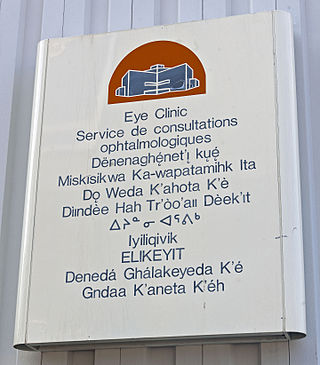
A multitude of languages have always been spoken in Canada. Prior to Confederation,the territories that would become Canada were home to over 70 distinct languages across 12 or so language families. Today,a majority of those indigenous languages are still spoken;however,most are endangered and only about 0.6% of the Canadian population report an Indigenous language as their mother tongue. Since the establishment of the Canadian state,English and French have been the co-official languages and are,by far,the most-spoken languages in the country.

English is a West Germanic language in the Indo-European language family,whose speakers,called Anglophones,originated in early medieval England. The namesake of the language is the Angles,one of the ancient Germanic peoples that migrated to the island of Great Britain. Modern English is both the most spoken language in the world and the third-most spoken native language,after Mandarin Chinese and Spanish. It is also the most widely learned second language in the world,with more second-language speakers than native speakers.

Irish,or Gaelic,also sometimes known outside Ireland as Irish Gaelic,is a Goidelic language of the Insular Celtic branch of the Celtic language family,which is a part of the Indo-European language family. Irish is indigenous to the island of Ireland and was the population's first language until the 19th century,when English gradually became dominant,particularly in the last decades of the century. Today,Irish is still commonly spoken as a first language in areas of Ireland collectively known as the Gaeltacht,in which only 2% of Ireland's population lived in 2016. It is also spoken by a larger group of habitual but non-traditional speakers,mostly in urban areas where the majority are second-language speakers. From 2006 to 2008,over 22,000 Irish Americans reported speaking Irish as their first language at home,with several times that number claiming "some knowledge" of the language.
References
- ↑ "Norwalk Reflector". Archived from the original on 2016-03-04. Retrieved 2012-06-18.
- ↑ Adams, Karen L. (1990). Perspectives on official English: the campaign for English as the official language of the USA. Walter de Gruyter. pp. 175–176. ISBN 978-0-89925-653-5.